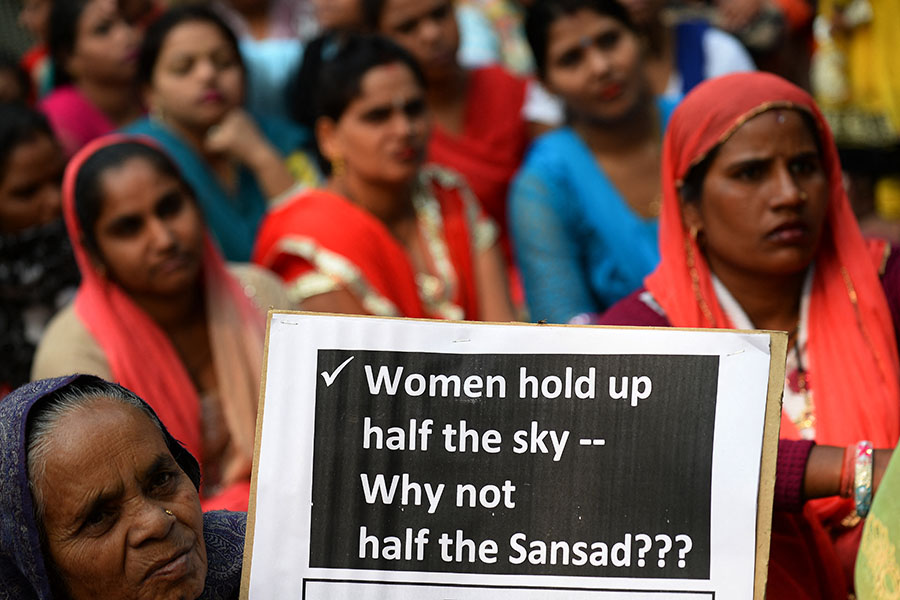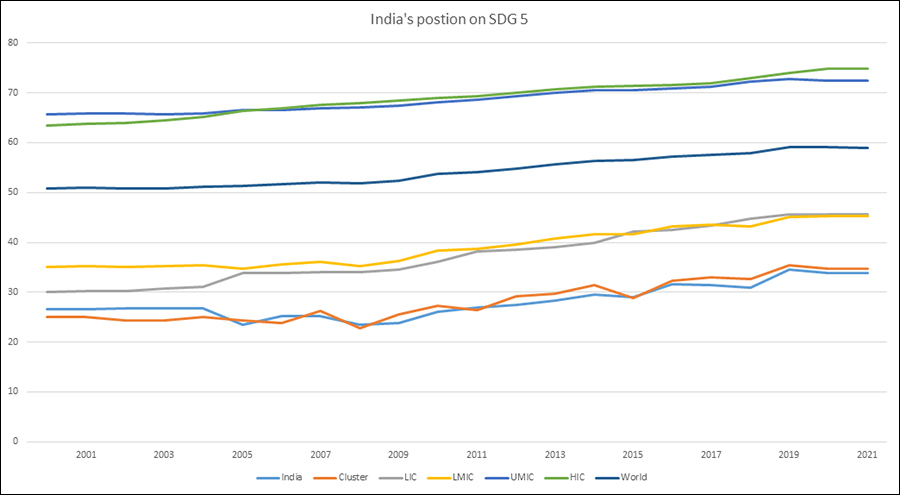
Women's Reservation Bill 2023: The need to do more than just pass the bills
If we are to earn the respect of the world as an economic superpower, it is high time that we as a nation stand up and acknowledge that it is not enough to launch schemes and programmes and pass bills. We need to pay far more attention to the actual process of implementation
 India is a signatory to the Convention on the Elimination of All Forms of Discrimination against Women (CEDAW), which requires the Government to adopt measures for the elimination of all forms of discrimination against women.
Image: Sajjad Hussain / AFP
India is a signatory to the Convention on the Elimination of All Forms of Discrimination against Women (CEDAW), which requires the Government to adopt measures for the elimination of all forms of discrimination against women.
Image: Sajjad Hussain / AFP
Over 20th and 21st Sept 2023, both houses of Parliament passed the Nari Shakti Vandan Adhiniyam or the Women's Reservation Bill 2023, to ensure equal representation of women in Lok Sabha and State Assemblies. Given that it is the first Bill to be passed in the new parliament house, the event can have symbolic as well as actual significance if it marks true intent on the part of our elected representatives to implement the Bill in letter and spirit. While political empowerment, which the Women's Reservation Bill represents, is just one form of women empowerment, the Bill needs to be viewed holistically from a larger lens of overall women empowerment, which includes economic, social, educational and legal empowerment, all of which are interlinked.
However, before we celebrate the passing of the Women's Reservation Bill, a few sombre facts need to be highlighted to put things in perspective. In a recent study, the authors analysed global data for 22 years for 163 countries (signatories to the 2030 Agenda for Sustainable Development of the UN) on progress made by each country on developmental parameters related to the 17 SDGs. The countries were divided into four clusters based on the World Bank Income group nomenclature—HIC (High-Income Countries), UMIC (Upper and Middle-Income Countries), LMIC (Lower and Middle-Income Countries) and LIC (Low-Income Countries). Progress data for a country for each of the SDGs were compared not only vis-à-vis global progress but also progress against countries in one's own cluster.
Also read: Explained: The Women's Reservation Bill and when will it be implementedThe findings of the study on SDG 5 are alarming for India, to say the least. Over the years, while the share of women in lower and single houses of national parliaments, as well as that of women in managerial positions, has been going up slowly but steadily in India, global improvement in these two aspects is far higher and faster. India has a long way to go before it reaches global standards in gender equality and empowerment. But, as the Figure below shows, the picture for India is even more shocking. For all the 22 years, the countries that have always appeared in the India cluster for SDG 5 are Afghanistan, Benin, Central African Republic, Cote d'Ivoire, Djibouti, Mali, Mauritania, Oman, Pakistan, Chad, Somalia and Yemen Republic, all of whom are among the bottom performers of Low-Income Countries, and also characterised by very high gender differentiation and discrimination against women. The two high-income countries that appear in the same cluster as India are Oman and Saudi Arabia, which have questionable gender equality records.

India is a signatory to the Convention on the Elimination of All Forms of Discrimination against Women (CEDAW), which requires the Government to adopt measures for the elimination of all forms of discrimination against women. The principle of gender equality is also enshrined within our Constitution, which guarantees gender equality and empowers the State to formulate affirmative action in favour of women. Moreover, the Government of India has been taking many initiatives for gender equality and women empowerment over the years, notable among them being schemes such as Beti Bachao Beti Padhao, the National Social Assistance Program, Pradhan Mantri Vyay Vandana Yojana and Scheme for Adolescent Girls, and so on. The National Education Policy 2020 advocates prioritising gender equity, Pradhan Mantri Mudra Yojana, Stand Up India, and Prime Minister's Employment Generation Programme that has provisions for helping women to set up their own enterprises, the Mahatma Gandhi National Rural Employment Guarantee Act, 2005 that makes provision for one-third of the jobs generated under the scheme to be given to women, and the Mission Shakti that addresses the issues of women on a life-cycle continuum basis, for making them equal partners in nation-building through convergence at different levels of governance.
Also read: Startups have potential to create 2 million jobs for women by 2030: Report
Unfortunately, as our study shows, as far as gender equality is concerned, India's performance at a global level continues to remain dismal despite all these laudable efforts. This is ironic and troubling, given India's position as the largest democracy and fifth-largest economy in the world. We do not have any time to lose. While the process of Census and delimitation can go on in parallel, implementing the Bill needs to begin in earnest and urgently. A few initiatives that can help fast-track the situation could include:
- Greater access to education, training and economic opportunities for women and girls—through microfinance and entrepreneurship programmes to provide them with income and independence.
- Increasing women's participation in decision-making at all levels of society by encouraging more women to run for office, appointing more deserving women to leadership positions, supporting women's organisations and networks (such as self-help groups) to provide support and resources, and advocate for women's rights and so on.
- Eliminating violence against women and girls by addressing the root causes of gender inequality and harmful social norms.
- Promoting gender equality in social and cultural norms by actively challenging gender stereotypes and promoting positive role models for women and girls.
- Educating and engaging with men and boys, as well as the general public, about the importance of gender equality.
- Providing access to healthcare and reproductive health services for women and girls to give women the power to control their fertility and make informed decisions about their lives.
- Using field data to track progress on women's empowerment and identifying areas for improvement.
Prof. Sanghamitra Bhattacharyya & Prof. Bappaditya Mukhopadhyay
Centre of Excellence for Sustainable Development, at Great Lakes Institute of Management, Gurgaon

















